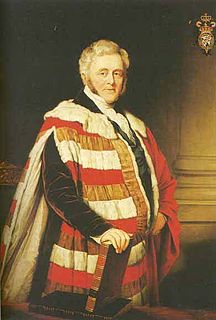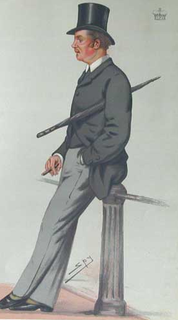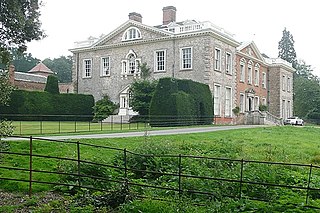Baron Vivian, of Glynn and of Truro in the County of Cornwall, is a title in the Peerage of the United Kingdom and held by a branch of the Vivian family. It was created on 19 August 1841 for the soldier Sir Hussey Vivian, 1st Baronet. He had already been created a baronet, of Truro in the County of Cornwall, on 19 January 1828. His eldest legitimate son, the second Baron, represented Bodmin in the House of Commons and served as Lord Lieutenant of Cornwall. His son, the third Baron, served as British Ambassador to Italy from 1891 to 1893. The latter's great-grandson, the sixth Baron, was a soldier and a Conservative member of the House of Lords. Lord Vivian was one of the ninety elected hereditary peers that were allowed to remain in the House of Lords after the passing of the House of Lords Act 1999. As of 2014 the titles are held by his only son, the seventh Baron, who succeeded in 2004.

Edward Strutt, 1st Baron Belper PC FRS, was a British Whig Party politician. He served as Chancellor of the Duchy of Lancaster from 1852 to 1854 under Lord Aberdeen.

George Hamilton Chichester, 3rd Marquess of Donegall, styled Viscount Chichester until 1799 and Earl of Belfast between 1799 and 1844, was an Anglo-Irish landowner, courtier and politician. He served as Vice-Chamberlain of the Household from 1830 to 1834, as well as from 1838 to 1841, and as Captain of the Yeomen of the Guard between 1848 and 1852. Ennobled in his own right in 1841, he was also Lord Lieutenant of Antrim from 1841 to 1883 and was made a Knight of St Patrick in 1857.

William Saunders Sebright Lascelles PC was a British Whig politician. He served as Comptroller of the Household from 1847 to 1851.

Lieutenant General Richard Hussey Vivian, 1st Baron Vivian, known as Sir Hussey Vivian from 1815 to 1828 and Sir Hussey Vivian, Bt, from 1828 to 1841, was a British cavalry leader from the Vivian family.

George Spencer-Churchill, 6th Duke of Marlborough, styled Earl of Sunderland until 1817 and Marquess of Blandford between 1817 and 1840, was a British nobleman, politician, and peer. The great-grandfather of Sir Winston Churchill, he served as Lord-Lieutenant of Oxfordshire between 1842 and 1857.

Captain Hugh de Grey Seymour, 6th Marquess of Hertford, styled Earl of Yarmouth from 1870 to 1884, was a British soldier, courtier and Conservative politician. He notably served as Comptroller of the Household between 1879 and 1880.

John Henry de la Poer Beresford, 5th Marquess of Waterford, styled Earl of Tyrone from 1859 to 1866, was an Irish peer and Conservative politician. He served as Master of the Buckhounds under Lord Salisbury from 1885 to 1886.
Lord Henry Richard Charles Somerset, PC, DL, JP was a British Conservative politician and composer of popular music. He served as Comptroller of the Household under Benjamin Disraeli between 1874 and 1879.
Lord George Thomas Beresford GCH, PC was an Anglo-Irish soldier, courtier and Tory politician. He served as Comptroller of the Household from 1812 to 1830.

Henry Strutt, 2nd Baron Belper,, styled The Honourable Henry Strutt between 1856 and 1880, was a British businessman, courtier and politician. Initially a Liberal, he left the party over Irish Home Rule and later held office as Captain of the Honourable Corps of Gentlemen-at-Arms from 1895 to 1905 in the Unionist administrations headed by Lord Salisbury and Arthur Balfour.
Sir Arthur Pendarves Vivian was a British industrialist, mine-owner and Liberal politician from the Vivian family, who worked in South Wales and Cornwall, and sat in the House of Commons from 1868 to 1885.

Frederick St John Newdigate Barne was a British army officer and a Conservative politician who sat in the House of Commons from 1876 to 1885.

Thomas Rowley Hill was an English Liberal politician who sat in the House of Commons from 1874 to 1885.
Captain William Villiers-Stuart, was a British soldier and Member of Parliament.
Captain Lord James Nugent Boyle Bernardo Townshend KCH, was a British naval commander and Tory politician.

John Charles Ramsden was a British Whig politician from Newby Park in Yorkshire. He sat in the House of Commons between 1812 and 1836.
Sir Robert Heron, 2nd Baronet was a British Whig politician. He sat in the House of Commons from 1812 to 1847, with a break in 1818–1819.
John Nicholas Fazakerley was a British Whig politician. He was Member of Parliament for Lincoln (1812–18), Great Grimsby (1818–20), Tavistock (1820), Lincoln again (1826-30) and City of Peterborough (1830–41).
Edmond James de Poher de la Poer, 1st Count de la Poer, known as Edmond James Power until 1863, and 18th Baron le Power and Coroghmore from 1851 to 1864, was an Irish Liberal politician.











